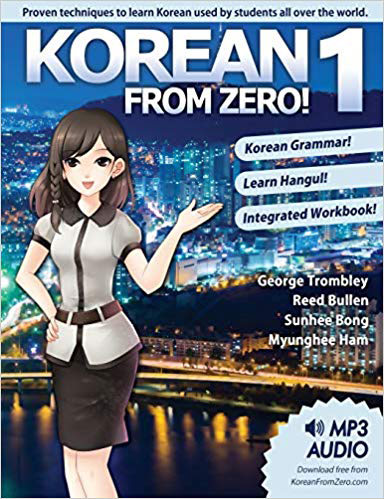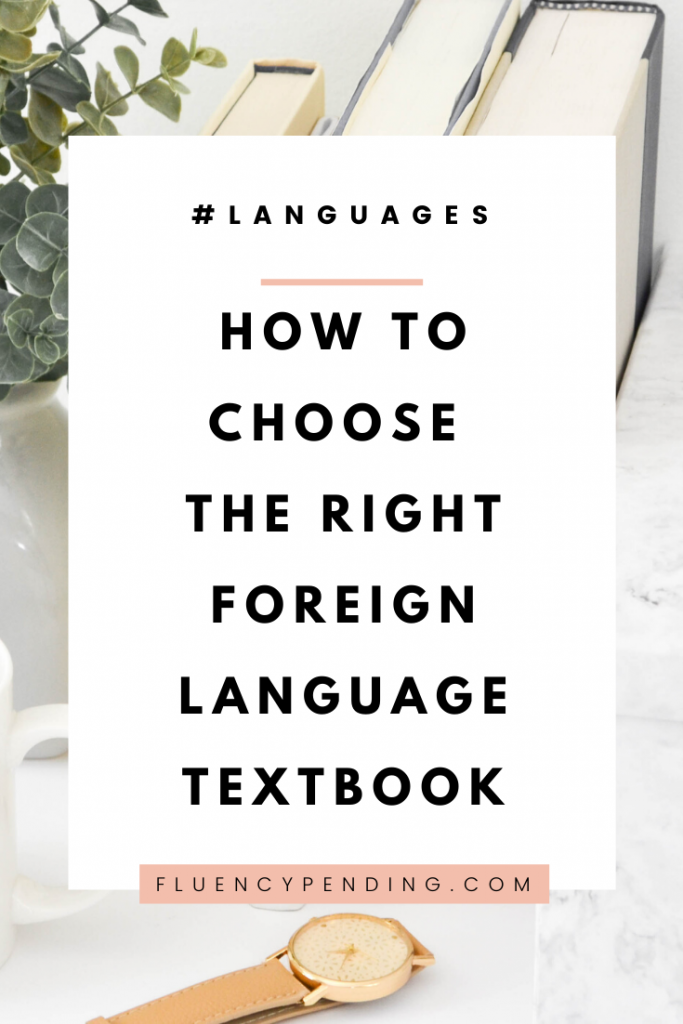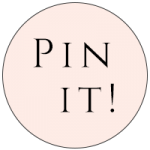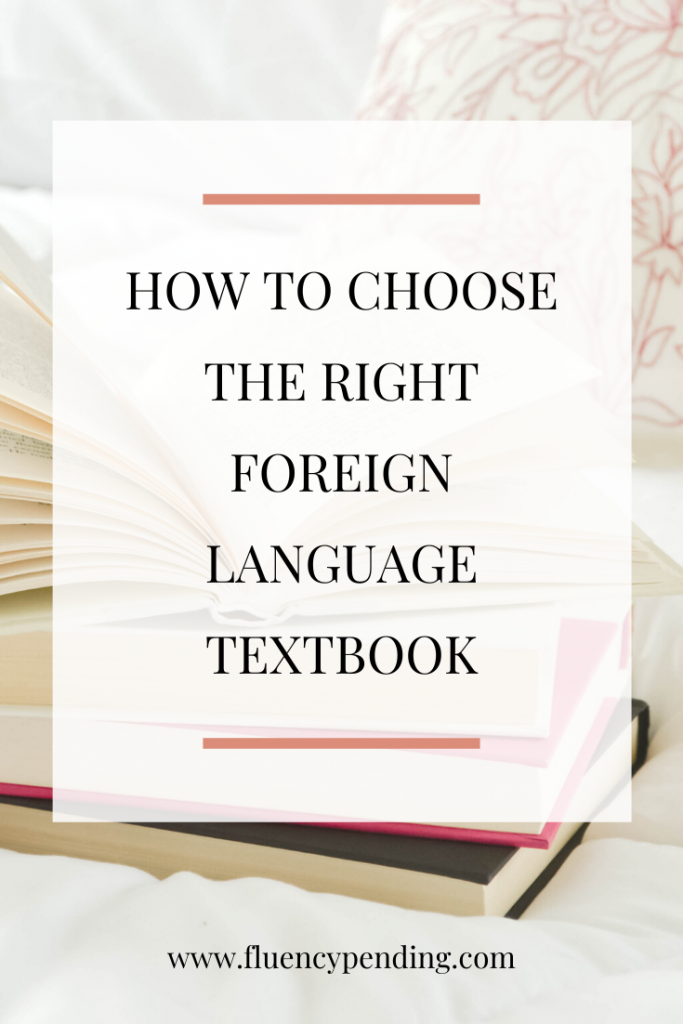
How to Choose the Right Foreign Language Textbook
Please keep in mind that some of the links in this post are affiliate links. In the event of a sale, I will be awarded a small commission (at no extra cost for you). Thank you for supporting my blog!
Foreign language textbooks have a bad rep for being boring, overly academic and too focused on grammar. A lot of language learning experts will advise you to stop worrying so much about verb conjugations and get out there and engage with the language and the people who speak it.
While textbooks should never entirely replace immersion activities such as speaking, watching films, listening to music and reading interesting material, they do play an important role in foreign language acquisition.
Language learning textbooks are generally carefully designed by learned people whose job it is to provide a structured, pedagogically sound roadmap for learning. As such a good textbook is an indispensable aid when trying to master a new language.
However, not all textbooks are created equal. It’s important to choose the right one for your specific goals and needs.
Here are some key questions to ask when choosing a foreign language textbook.
Does the textbook suit your goals?
There are a great variety of language learning textbooks out there, but not every textbook will suit your individual needs.
Some textbooks are created with very specific audiences in mind. That’s why it’s important to get clear on what your goals are so you can choose the right fit for you.
Let’s take me as an example. I’m just starting out learning Korean from scratch. As an absolute beginner, I am looking for a useful introductory Korean textbook that will teach me the basics in a structured yet interesting way. My goals are:
- To review and reinforce Hangul
- To get guidance on pronunciation
- To learn conversational Korean
I have opted to start with the Kindle version of this textbook because it suits my needs, the fact that Amazon delivery to South Africa is a complete nightmare, and my pocket.

Now, if my goal was to do business in Korea, I might be more interested in this book.
Even more specifically, if my aim was to study Business Administration at a Korean university, I’d definitely consider this textbook. (By the way, well done to you if this is your actual goal. That’s mad impressive.)
Choose a textbook that aligns with your language learning goals. Learning business jargon when you actually just want to exchange gossip with your native speaking friends is not going to be very helpful.
Does your foreign language textbook suit your level?
If you’re an absolute beginner, finding a textbook at your level should not be too difficult. Most foreign language textbooks are published in series and will be helpfully numbered from book one onward. You’ll also often see titles such as ‘for beginners’ or ‘from zero’. This makes it easy to shortlist beginner textbooks for further comparison.
At the intermediate stage things can get a bit trickier, especially if you have been using various resources to reach your current level. Should you start with book 3 or 4? Are you Intermediate or Upper Intermediate?
The best way to determine if a textbook is suitable for your proficiency level is to spend a bit of time with it. If your bookstore is not too strict about touching the merchandise, have a thorough browse through the book to see what content is covered. Online, you can use the ‘look inside’ function in Amazon or Google books to get a feel for the lessons. If you need a little bit more time with the book, check to see if your local library has a copy.
If you’ve been learning the language for a while, not everything will be brand new information. Choose a textbook that introduces enough new concepts to be challenging but not overwhelming. Don’t just skip through the bits you already know, though. Sometimes you can get valuable insights from old information when it is presented in a new way.
If you’re stuck in the intermediate twilight zone like I am with Mandarin, you may need a combination of textbooks. I use both HSK 5 and 6 material to study Mandarin because I haven’t followed a linear path to get to where I am and I’ve missed a few of the basics along the way.
Does it offer a clear path for progression?
Look for a textbook series that will allow you to build on your knowledge in a logical progression. This kind of scaffolding is great for self-study because it serves as a structured roadmap for learning when you don’t have a set curriculum.
A series is also great for goal setting and motivation since you can track your progress as you work your way through the set.
Is it still relevant?
I’m hesitant to advise anyone to only buy the latest, most expensive edition of a textbook. I feel very strongly that finances should not be a barrier to entry for language learning. Picking up a slightly older edition of a textbook is actually a great way of saving money. Much of the information should still be relevant and you can get a second-hand or discounted copy.
However, language is dynamic and textbooks do become outdated. If your book comes with cassette tapes and features a dialogue about sending a telegram, there’s a good chance that you’ll have to navigate musty expressions and outmoded teaching approaches.
Does your textbook teach natural-sounding dialogue?
One of the biggest problems I found with foreign language textbooks during my stint as an Afrikaans tutor is that a lot of them teach awkward, contrived dialogue. You don’t want to end up sounding like an alien approximating human speech.
Ask your tutor or a native speaking friend to have a quick look at the dialogues. If they say something like ‘Nobody speaks like that!’, it’s probably not right.
Does it explain grammatical concepts in a way that is easy to understand?
I know a lot of people don’t want to hear this, but grammar is so important. A good textbook will devote at least some time explaining key grammatical concepts introduced in the text or dialogue.
How this information is presented is going to affect how much of it you’ll take in. If the explanations are so dry and academic that it puts you to sleep, that’s no good. Equally, if the text just briefly skims over complex concepts in an effort to be accessible and friendly, that’s not going to be of much use to you either.
Personally, I like textbooks that offer a lot of sample sentences to reinforce the grammar points in context. Books that teach you how to avoid the most common mistakes non-native speakers make when speaking or writing are also very useful.
Does it offer plenty of practice?
Look for a textbook that offers lots of exercises to help reinforce the lessons introduced in each module. Many textbooks offer a separate workbook with additional assignments. While this is an extra expense, it’s worth investing in a good workbook to really get those concepts nice and sticky.
Make sure your textbook includes a key so you can check your answers. If it doesn’t, see if this is available online.
Does your textbook include audio-visual aids?
Be wary of any foreign language textbook that forces you to slog through purely text-based lessons. The lack of variety will quickly become boring, and you will also be deprived of valuable listening practice. Opt for a book that offers a good mix of text, audio and video resources. There will usually be an associated website or app where you can access audio-visual aids.

Does it introduce interesting topics?
As a beginner language learner, you’re going to have to resign yourself to the fact that a lot of textbooks will start off with dry as two-day old toast topics such as ‘my family’ or ‘at the bank’. This is sometimes a necessary evil to get the basics down, but a lot of good textbooks manage to inject some humour and interest into lessons while still covering the most important aspects of the language.
Have a read through the index to see if the topics spark your curiosity. While you’re at it, also check out the tone of the writing. Is it likely to keep you engaged?
Does it offer some cultural insights?
For me, one of the most interesting parts of learning a new language is getting a glimpse into a different society and its customs and traditions. Some textbooks will include interesting notes to equip you with some cultural knowledge.
What do others have to say about it?
I usually take Amazon and other customer reviews with a pinch of salt, but if a textbook has overwhelmingly negative feedback online this should raise some red flags.
Do your research and see what trusted language learning bloggers and teachers have to say about the book you’re considering.
If you come across a review by someone you don’t know, be aware that some people get paid to do promotions or will get some sort of compensation for pushing affiliate links. No textbook is perfect, so be skeptical of any reviewer that can’t come up with a single negative aspect. If it seems too good to be true, it probably is.
Is it affordable?
Price is an important factor when choosing a language textbook. Don’t put yourself in a tight spot to buy that expensive but highly recommended textbook or course. Shop around a bit.
You might find a more affordable textbook that covers the same material or a cheaper second-hand copy of the book you want. Basically, the rule for buying a language learning textbook is the same as for buying shoes. Buy the best you can afford.
More things to consider when choosing a foreign language textbook
Here are a few general things I look for in a foreign language textbook:
The four pillars of language learning – Does the book offer a good balance between listening, writing, speaking and reading in the lessons and exercises?
A logical layout – Is the textbook well signposted and easy to navigate? How easy is it to look up specific concepts?
A good size – I prefer a larger size textbook. Mostly because I’m blind but also because I like to jot down notes in the margins.
Good quality paper and binding – You’re going to be using your textbook a lot and it will get battered. Look for something that can withstand heavy usage.
The general feel – This may sound a bit wishy-washy but you’ll soon know if you’re just not feeling the book. Sometimes it’s just a nope and that’s OK.
What do you look for in a foreign language textbook? Do you have any good textbooks for your target language to recommend?





